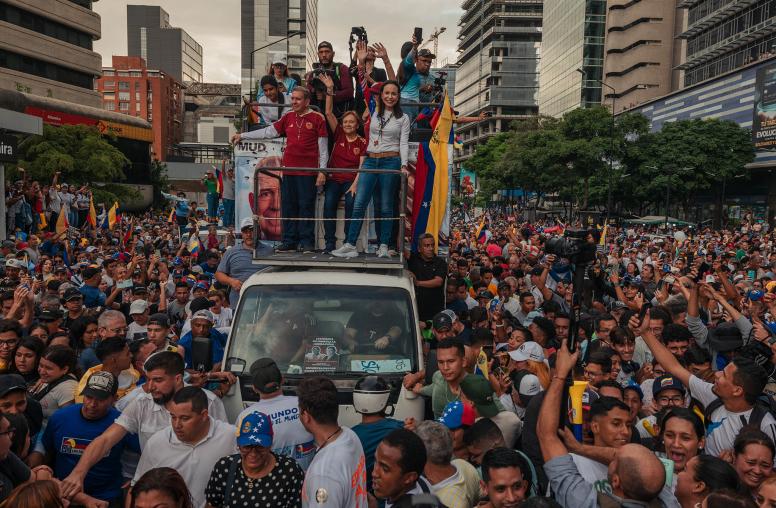Preventing Election Violence
A USIP Fact Sheet
State of the Field
In many countries, elections are a flashpoint for violence. Far too often, programs designed to prevent election violence are based on intuition instead of evidence, or efforts concentrate solely on logistical or technical support on election day. When prevention efforts fail and violence erupts, officials may respond with a counter-productive crackdown, citizens lose trust in the ability of government and the rule of law to protect them, and years of development efforts are reversed.
USIP’S Work
The U.S. Institute of Peace conducts research and training, to study and disseminate evidence of what works to reduce election-related violence. The results improve the knowledge and skills of policymakers and professionals charged with maintaining the peace, in turn helping safeguard the very processes that uphold democratic institutions. USIP also applies its research to its own programs on the ground to prevent election-related violence. The Institute’s recent work includes:
Researching What Works. When is the best time to intervene? Which methods are the most effective and cost-efficient—and in which contexts? USIP’s research probes for answers to these questions, adding essential knowledge to the practice of preventing election violence.
USIP studied the impact of eight common tactics in five nations: Bangladesh, Honduras, Malawi, Moldova, and Thailand. The findings—published in a new USIP book titled Electing Peace: Violence Prevention and Impact at the Polls—include:
- Supporting security forces and election commissioners in providing quality election administration and security represents the most promising route to peaceful elections.
- International monitoring of conditions leading up to a vote as well as during and after balloting has been effective in preventing violence.
- Programs that seek to ease citizen frustrations and their sense of marginalization through voter discussions with political leaders or via initiatives to involve youth may appear to be logical and valuable tactics, but their impact is modest or unclear.
Results Shape an Emerging Field. Government officials, international organizations, and NGOs routinely request the Institute’s guidance in designing election strategies and programs. For example:
- USIP’s research aids decision-making through briefings to the U.S. Department of State, the U.S. Agency for International Development, the African Union, the European Parliament, the Carter Center, and the International Foundation for Electoral Systems.
- The Institute’s findings prompted an organization that supports democratic development to shift funding to mechanisms that help police and community leaders outside urban areas anticipate violence and prevent it, or respond more quickly and effectively when it breaks out.
- USIP is creating a guide to help decision-makers match appropriate prevention approaches to various forms of election violence.
- In 2017, the Institute will evaluate peacebuilding efforts leading up to elections in Liberia and Kenya, adding even more data to its evidence-based study of prevention practices.
Training Practitioners. Election violence prevention has traditionally centered on engaging certain demographic groups, like youth, or the logistical aspects of election day. USIP’s courses add peacebuilding to the mix, helping participants identify election security risks and apply alternative prevention techniques for a more sustainable result.
Development and NGO officials, election commission and international organization representatives, diplomats, country specialists, and election personnel—including poll workers and security forces—attend USIP’s workshops. With guest speakers, case studies from a range of election environments, and interactive exercises, participants explore the risks and possible solutions to design effective programs to prevent violence.
Delivering Informed Support in the Field. Working through local partners, USIP supports election commissions, election monitors, the security sector, and civil society with evidence-based expertise. For example:
- In the run-up to the peaceful 2015 elections in Burma, USIP helped the Myanmar Police Force develop a code of conduct that officers carried on election day to guide them in responding effectively to any incidents.
- The Institute conducted pilot projects in Afghanistan in 2014 to improve the ability of communities to ensure peaceful elections and to persuade citizens to participate. As part of its broader efforts, USIP helped replicate a successful 60 Second Film Festival it supported in Pakistan a year earlier. The Institute and its local partners also leveraged cricket, poetry, and other Afghan cultural traditions for community outreach.
- In 2013, USIP supported civic education on the importance of peaceful voting in Pakistan. It also trained 900 citizen journalists to report violence in regions where public information is harder to find. These citizen journalists were instrumental in breaking stories of women being prevented from voting. Their reports led to legislation that is under consideration to criminalize efforts to prevent women from voting.
| Investing in Preventive Diplomacy |
| Diplomats often try to help when elections carry the risk of violence. They use their stature and leverage to persuade or coerce players to resolve disputes or refrain from violence. But the conditions for engaging successfully remain unclear. USIP’s Jennings Randolph Senior Fellow Bhojraj Pokharel is applying his experience with the U.N., the Carter Center, and as head of the Nepal Election Commission to help fill that knowledge gap by examining the role of preventive diplomacy in combating election violence. |


